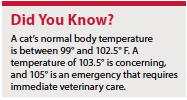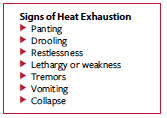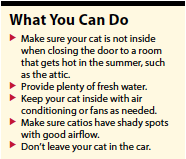While cats love napping in the sun, hot weather brings a risk of heat exhaustion or heat stroke.
Cats can get overheated the same ways we can: prolonged exposure to high temperatures, prolonged time in direct sun without access to shade, not enough water, being really stressed, and/or exercising too hard.
If the cat can’t cool down, prolonged high body temperature can lead to organ failure and eventually death.
Who’s At Risk
Outdoor cats are more likely to experience heat exhaustion, but their indoor compatriots  aren’t fully protected either. Enclosed spaces with poor ventilation, such as closets, porches, and attics, can quickly heat up in the summer months. If your cat sneaks in, he could get trapped when you close the door.
aren’t fully protected either. Enclosed spaces with poor ventilation, such as closets, porches, and attics, can quickly heat up in the summer months. If your cat sneaks in, he could get trapped when you close the door.
Other groups of cats who are more susceptible to overheating include:
- Overweight cats
- Senior cats
- Cats with heart conditions
- Cats with respiratory conditions
- Brachycephalic cats such as Persians with short, flat faces
 Emergency Care
Emergency Care
If you suspect a cat has heat exhaustion, swift action can save her life:
- Move the cat out of the sun to an area with good airflow.
- Gradually cool the cat’s body temperature by wrapping her in damp towels. Cool or room temperature is fine—ice cold is too cold. A rapid drop in temperature is dangerous, especially in the cat’s already compromised state.
- Take the cat’s temperature, if possible, with a rectal thermometer.
We recommend digital thermometers as they are much faster than mercury thermometers. But, if you’re concerned about heat exhaustion, skip the temp check and just go to the veterinary office.
 A prompt, thorough exam can identify early signs of organ damage and allows the veterinarian to start treatment to halt the progression of heat stroke and shock. The veterinary team will likely give subcutaneous or intravenous fluids to quickly restore the cat’s hydration and electrolytes. Bloodwork can give insight into organ function.
A prompt, thorough exam can identify early signs of organ damage and allows the veterinarian to start treatment to halt the progression of heat stroke and shock. The veterinary team will likely give subcutaneous or intravenous fluids to quickly restore the cat’s hydration and electrolytes. Bloodwork can give insight into organ function.
Depending on how severe the cat’s heat exhaustion is, she may need to stay in the hospital for observation. The veterinary team will monitor her temperature to make sure that it stays within normal bounds. Bloodwork may be repeated over the next few days to monitor organ function and make sure that she doesn’t have any permanent damage. Signs of organ failure can take several days to appear, so it is important to keep an eye on her if she is allowed to go home.




